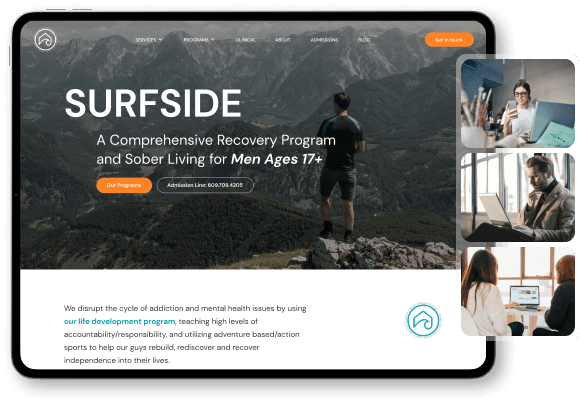blog
How to Use Content Marketing to Connect with Potential Clients
Oct 15, 2024
For mental health professionals, content marketing is more than just a marketing strategy—it’s a way to build trust, establish authority, and connect with clients who may be seeking support. By creating valuable, informative content, you can address common questions, share insights, and make mental health resources accessible to those who need them most. Effective content marketing can position you as a trusted source, attract new clients, and provide lasting value to your audience.
In this article, we’ll explore key content marketing strategies tailored for mental health professionals. From blogs to client success stories, these content ideas can help you connect with potential clients, answer their questions, and encourage them to reach out for support.
1. Create a Mental Health Blog to Educate and Inform
Blogging is one of the most powerful content marketing tools for mental health professionals. By consistently publishing informative blog posts, you can provide valuable insights, answer common questions, and position yourself as an expert in your field.
Answer Common Client Questions: Write posts that address frequently asked questions, such as “How Do I Know If Therapy Is Right for Me?” or “What to Expect in Your First Therapy Session.” These posts provide value to clients by addressing concerns and can help new visitors find your website through relevant search queries.
Discuss Specific Mental Health Topics: Consider creating content around specific mental health topics, such as anxiety, depression, stress management, or trauma recovery. Addressing these topics shows your expertise and offers clients the information they may be seeking as they consider therapy.
Share Tips and Strategies: Practical advice, such as “10 Techniques to Manage Daily Stress” or “Ways to Cope with Anxiety in Social Situations,” resonates with readers looking for actionable solutions. These types of posts can help you reach a broader audience and demonstrate your ability to provide guidance.
2. Develop Resource Guides for Potential Clients
Offering comprehensive resource guides can provide immense value for clients looking to learn more about mental health. Resource guides can serve as downloadable content or be published directly on your website, making it easier for clients to understand complex issues and explore their options.
Create Downloadable PDFs or eBooks: Develop in-depth resources on topics like “Anxiety Management Guide” or “Coping with Grief.” Clients can download these resources, helping them feel informed and supported. Plus, downloadable resources provide an opportunity for email list building if clients provide their email addresses to access them.
Compile Helpful Articles in a Guide: Gather related blog posts or articles into a guide format that covers essential topics. For example, you could create a “Mental Health Self-Care Toolkit” with sections on mindfulness, relaxation techniques, and emotional support.
Offer Worksheets and Interactive Tools: Worksheets can be highly effective for clients looking to manage specific challenges, such as mood tracking, gratitude journaling, or goal setting. These resources engage users actively and provide actionable value, encouraging them to come back to your website.
3. Share Client Success Stories (With Permission)
Success stories are a powerful way to showcase the positive impact of therapy while connecting with potential clients. Highlighting the transformative journey of past clients (while maintaining confidentiality) can be inspiring and show prospective clients the value of your services.
Write Case Studies: With client permission, create case studies that detail a client's journey through therapy, focusing on the challenges they faced and how therapy helped them achieve their goals. Real-life examples provide relatability and build trust.
Use Testimonials: Ask satisfied clients for testimonials that can be shared on your website or social media. Testimonials provide third-party validation and are often key to building credibility with potential clients who are considering therapy.
Showcase Success Without Specifics: If privacy is a concern, consider sharing generalized success stories that highlight common challenges and outcomes without revealing identifiable details. For instance, you could write about a client who overcame social anxiety through consistent therapeutic work and how their life changed.
4. Host Webinars and Q&A Sessions
Virtual events like webinars and Q&A sessions offer real-time interaction with potential clients, helping you build a personal connection and demonstrate your expertise. Webinars allow you to engage your audience, answer questions, and showcase your approach to mental health.
Hold Educational Webinars: Host webinars on topics like “Understanding Trauma” or “How to Cope with Anxiety.” Webinars allow you to go deeper into topics, answer participant questions, and provide attendees with valuable knowledge. You can also record the webinar to offer it as on-demand content afterward.
Offer Q&A Sessions: Q&A sessions are a great way to address specific client concerns. Hold live sessions on social media platforms, where clients can submit questions anonymously. This can help reduce stigma, as clients see that others may have similar questions.
Create Recordings for Future Use: Record your webinars and Q&A sessions so you can repurpose them as content for your website, blog, or social media. Recorded content also helps you reach clients who couldn’t attend the live event.
5. Utilize Video Content to Build Trust and Engagement
Video content allows clients to see and hear from you directly, which can be especially comforting in the mental health field. Videos give a sense of your personality and approach, helping clients feel more connected before they even step into a session.
Introduce Yourself in a “Meet the Therapist” Video: A short video introducing yourself, your background, and your therapeutic approach helps clients get to know you. This can reduce anxiety about starting therapy and make potential clients feel more comfortable reaching out.
Create Explainer Videos on Mental Health Topics: Brief videos on mental health topics—like “Understanding Mindfulness” or “What is Cognitive Behavioral Therapy (CBT)?”—are informative and help clients understand different treatment methods.
Share Client-Friendly Tips: Consider making short video clips with tips for managing stress, anxiety, or other issues. Video tips are easy to share on social media and can reach a larger audience, increasing your online presence and visibility.
6. Develop a Comprehensive FAQ Section
An FAQ section is an essential addition to any mental health website. It provides clients with answers to common questions, alleviating concerns and establishing your authority as a mental health professional.
Address Common Questions About Therapy: Many potential clients have questions about what therapy entails. Include questions like “What should I expect in my first session?” or “How long do therapy sessions usually last?” This information helps set expectations and builds trust.
Discuss Payment and Insurance Options: Clients often have questions about payment, insurance, and session costs. Providing clear, upfront answers can help clients feel more comfortable reaching out and reduces financial uncertainty.
Include Information on Privacy and Confidentiality: Privacy is crucial in mental health, so address questions about confidentiality, online session security, and data protection. By prioritizing privacy in your FAQ, you reassure clients about the safety of their information.
7. Leverage Social Media to Share Content and Engage with Clients
Social media is a powerful channel for sharing your content, expanding your reach, and building connections with potential clients. Posting regularly on platforms like Instagram, LinkedIn, or Facebook helps you share helpful resources and keeps your audience engaged.
Post Mental Health Tips: Share bite-sized mental health tips, inspirational quotes, or mindfulness exercises. These types of posts are quick and easy for users to engage with and are highly shareable, increasing your visibility.
Promote Blog Posts and Resources: Use social media to drive traffic back to your website by sharing links to your blog posts, guides, and resources. This helps increase website traffic and provides more exposure for your content.
Engage with Comments and Messages: Respond to comments and messages thoughtfully. Engagement builds rapport and shows clients you’re approachable and attentive. Be mindful of professional boundaries, and provide information that helps users feel informed and supported.
8. Create and Share Newsletters to Keep Clients Connected
Newsletters are an excellent way to share updates, new blog posts, and helpful resources directly with your clients. By regularly connecting with clients through email, you maintain ongoing communication and keep your services top-of-mind.
Send Monthly Newsletters: Send monthly or bi-monthly newsletters with links to recent blog posts, upcoming webinars, and helpful mental health tips. Newsletters are a great way to keep your audience engaged and encourage repeat visits to your website.
Include Calls-to-Action (CTAs): Use CTAs like “Schedule a Consultation” or “Read Our Latest Blog Post” to guide clients back to your website and encourage action.
Offer Exclusive Content for Subscribers: Give your newsletter subscribers access to exclusive resources, such as downloadable worksheets, to make them feel valued and encourage sign-ups.
Final Thoughts: Building Trust and Visibility Through Content Marketing
Content marketing is a powerful way for mental health professionals to connect with potential clients. By creating valuable, informative, and engaging content, you can build trust, demonstrate expertise, and make it easier for clients to find the support they need. From blogs and resources to video content and webinars, each of these strategies can help attract new clients and foster meaningful connections with those in need of mental health services.
Investing time and effort into content marketing will not only strengthen your online presence but also provide valuable resources to your audience, positioning you as a trusted ally in their journey to mental wellness.
Do you find this article useful?
We create beautiful websites for mental health businesses that will help families and people in need to make the right choice. Let us help you improving your website, we got the experience and the passion to convert visitors into customers.
Get in touch and let us help you with your website
Prev
Next



